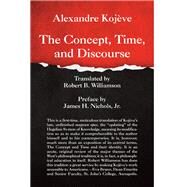The Concept, Time, and Discourse
, by Kojeve, Alexandre; Williamson, Robert B.; Nichols, James H., Jr.- ISBN: 9781587311543 | 1587311542
- Cover: Hardcover
- Copyright: 5/27/2019
Alexandre Kojčve (19021968) is most widely known in America for his provocative assertion that history is at its end, that is, its completion. In the "practical" sense, this means that the process of historical development can at last be seen (if from a distance) as the realization of the Marxist "universal and homogeneous state." However, Kojčve claimed as well that the history of philosophical thinking had also reached its goal in the transformation of philosophy, as the "love of wisdom" (or the unsatisfied quest for comprehensive knowledge), into that very Wisdom itself and had done so in the most essential respects in the philosophy of Hegel. The Concept, Time, and Discourseis the first volume of Kojčve's magnum opus, which was to have given an exposition of the (Hegelian) System of Knowledge and of which five volumes were written before his death. It contains, along with a preliminary discussion of the need for an updating of the Hegelian system, the first two of three introductions to the exposition of that system: a First Introduction of the Concept (the integrated totality of what is comprehensible, which is the final object of philosophic inquiry) and a Second Introduction concerning Time, both introductions leading to the (Hegelian) identification of the Concept with Time, an identification which alone takes adequate account of the fact that Philosophy is necessarily discursive (that it must actualize the requirements and essential structure of Discourse). The present volume offers Kojčve's fullest statement of his Ontology. It includes a critical discussion of the traditional oppositions of the "general" to the "particular" and of the "abstract" to the "concrete" and an analysis of the act of "generalizing abstraction," which detaches Essence from the Existence of Things. Kojčve then discusses the three great figures in the three-stage development of philosophy into wisdom: Parmenides, Plato, and Hegel. Parmenides' monadic account of Being (= Eternity) rendered it ineffable, thereby reducing philosophy to (non-philosophic) silence; Plato's dyadic account of Being (as eternal) was intended to make Being a possible subject of discourse but failed to reflect adequately the triadic (and temporally developing) structure which Plato himself discerned in Discourse. Finally, Hegel's triadic account of Being as itself "dialectical" achieved the final identification of the Concept with Time.







